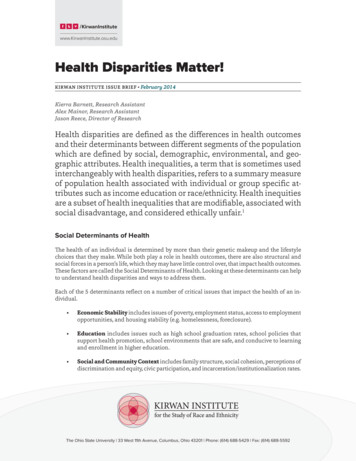
Transcription
Coming Out As TransComing out as trans* can be a challenging process, and most likely will not be a one-time event.While it has some similarities with coming out as lesbian, gay, or bisexual, coming out as trans*poses some unique challenges.In relation to coming out as LGBFor many people it is easier to wrap their minds around being lesbian, gay, or bisexual than it isfor them to understand being trans*. After all, there is no one trait more fundamental to the waypeople perceive others in our society than that of gender. While many people are still ignorantabout LGB people, far more lack correct knowledge about trans* people (including queer trans*people). Thus, there are more false assumptions to wade through, more stigmas to overcome.Some see being trans* as more of a choice than being lesbian, gay, or bisexual since some peoplechoose to transition. Also, being trans* is much more difficult to hide or ignore with friends andfamily members, especially if one pursues physical transition. Like coming out as LGB, though,many people need some time to adjust to the new knowledge about their friend or familymember's identity.Choosing the best timeThere are several important factors to consider when picking the right time to come out. One ofthe most important things to keep in mind is your financial stability. If there is a strongpossibility that your parents or providers would cut off all financial support, waiting until youcould have financial independence would be in your best interest. While the EEOC has ruled thatsex discrimination protection in the workplace now includes trans* and gender non-conformingpeople (as of May 2012), having a solid job and a financial plan for the worst case scenario is agood place to start. Also, there may be certain times that people will be more receptive to yourcoming out than others. For instance, coming out right before a major holiday with one's familymight not be the best option. Coming out at the very beginning of winter or summer break whenyou will be stuck in your parent's home for the next month or two may also not be the best idea.However, if one puts off coming out too much, parents will sometimes be much more upset thatthey were left in the dark for so long. In the end, there probably will not be a time that feels likethe "right" time – the trick is to find a time that is not a particularly "bad" one and to go for it.Who to come out toAfter coming out to one's self, it is helpful to start coming out to people that you know willdefinitely be supportive. In doing so, you can create a supportive network around you so you willhave people to rely on when coming out to the more difficult friends and family members.Sometimes, coming out can be very emotionally taxing, so try to pace yourself. You should notfeel an obligation to come out to everyone all at once, and you should not feel like you arealways obligated to explain yourself. When choosing who to come out to, keep in mind what youwant from people and be direct about it. If you want to be addressed by a different name andpronoun in the classroom, obviously you will need to come out to your professor. Coming out toall of your classmates may or may not be an issue.Methods of coming outThere are several ways of coming out, and the method you use can be determined by how you
communicate best, how close you are to the person to whom you are coming out, and by othercircumstances like distance and time frames. If face-to-face confrontations are difficult, writing aletter (whether it is delivered in person then discussed afterward or just dropped in the mail box)is also a great way to come out. Email and telephone calls are also possibilities, especially forreaching numerous co-workers, professors, and classmates.Coming Out To ProfessorsEmails work greatA simple email explaining your situation to professors or classmates could make transitioningmuch easier. Emails can be useful in explaining your situation to professors that previously knewyou by a different name. They can also be useful in informing professors that you go by adifferent name and gender than the one they have on the class roster.Some general ideas of what to say in an email are:·Statement of the name/gender they have on class roster.·State preferred name and gender ("I prefer to be referred to by pronouns").·Brief explanation ("I identify as trans*, which means to me.").·"I prefer for no one to know about my trans* status" vs. "I would be willing to talk about beingtrans* as it related to class discussion" (depending on class and personal preference).·Thank them for being understanding.·Say they can email you if they have questions.·Provide your contact information.·Provide them with relevant websites for more information.A sample email might look like this:Professor ,I am a student in your (insert class name here). I am getting in contact with you to let you knowthat I identify as (insert identity here). My name will probably show up on your roster as (insertlegal name here), but I would prefer to go by (insert chosen name here) and (insert preferredpronouns) pronouns. I will be putting (insert chosen name here) on my assignments and wouldappreciate it if you called me that in class. If you have any questions for me regarding this,please don't hesitate to contact me. My email address is (insert email address here) and my phonenumber is (insert phone number here).Thank you very much for your understanding,(sign with chosen name)Facebook and other online communitiesNow that a majority of students are connected through Facebook (or other online communities),it is really easy to reach many people rather quickly instead of having to look up everyindividual's email or to try to talk face to face with every person you know.
College/Department-wide listservesMost departments have listserves that make it easy to get in touch with everyone in yourprogram. You could utilize this type of listserve if broadcasting it is how you desire to come out.Coming Out To ParentsKNOW WHAT TO EXPECTMost Follow Typical StagesThe purpose of this is to inform gay and lesbian young adults about the process most parents gothrough when their child's homosexual orientation is disclosed. The stages to be explained are:shock, denial, guilt, expression of feelings, personal decision-making, true acceptance. Theprocess assumes that you have wrestled with the issue of whether or not to come out to yourparents and that your decision is affirmative. The approach and suggestions offered in thefollowing are based on the assumption that you suspect one or both of your parents will beunderstanding, if not supportive, given adequate time. This resource may not be helpful if youhave serious reservations about their ability to cope and you suspect they could sever theirrelationship with you.They Go Through Stages DifferentlyA caution: Each family is unique. Although most are likely to follow the stages outlined here,allow some latitude for your own parents. The illustrations and suggestions given here will bedrawn from conversations with parents who have attended the Philadelphia Parents and Friendsof Lesbians and Gays (PFLAG) meetings. Few parents are "model" cases that perfectly fit thefollowing description. Knowing what to anticipate and how to respond in a helpful way willenable you to take the big step with some degree of knowledge and support.QUESTIONS TO ASK YOURSELFBe Clear in Your Own Mind Are you sure about your sexual orientation? Don't raise the issue unless you're able torespond with confidence to the question "Are you sure?" Confusion on your part willincrease your parents' confusion and decrease their confidence in your judgment. Are you comfortable with your gay sexuality? If you're wrestling with guilt and periodsof depression, you'll be better off waiting to tell your parents. Coming out to them mayrequire tremendous energy on your part; it will require a reserve of positive self-image. Do you have support? In the event your parents' reaction devastates you, there should besomeone or a group that you can confidently turn to for emotional support and strength.Maintaining your sense of self-worth is critical.
Are you knowledgeable about homosexuality? Your parents will probably respond basedon a lifetime of information from a homophobic society. If you've done some seriousreading on the subject, you'll be able to assist them by sharing reliable information andresearch. What's the emotional climate at home? If you have the choice of when to tell, considerthe timing. Choose a time when they're not dealing with such matters as the death of aclose friend, pending surgery or the loss of a job. Can you be patient? Your parents will require time to deal with this information if theyhaven't considered it prior to your sharing. The process may last from six months to twoyears. What's your motive for coming out now? Hopefully, it is because you love them and areuncomfortable with the distance you feel. Never come out in anger or during anargument, using your sexuality as a weapon. Do you have available resources? Homosexuality is a subject most non-gay people knowlittle about. Have available at least one of the following: a book addressed to parents, acontact for the local or national PFLAG, the name of a non-gay counselor who can dealfairly with the issue. Are you financially dependent on your parents? If you suspect they are capable ofwithdrawing college finances or forcing you out of the house, you may choose to waituntil they do not have this weapon to hold over you. What is your general relationship with your parents? If you've gotten along well and havealways known their love -- and shared your love for them in return -- chances are they'llbe able to deal with the issue in a positive way. What is their moral societal view? If they tend to see social issues in clear terms ofgood/bad or holy/sinful, you may anticipate that they will have serious problems dealingwith your sexuality. If, however, they've evidenced a degree of flexibility when dealingwith other changing societal matters, you may be able to anticipate a willingness to workthis through with you. Is this your decision? Not everyone should come out to their parents. Don't be pressuredinto it if you're not sure you'll be better off by doing so -- no matter what their response.THEY'LL EXPERIENCE LOSSParents and Children Switch RolesWhen you come out to your parents, you may find your parent-child roles reversed for a while.They will need to learn from your experience. As your parents deal with your disclosure, you
must assume the "parenting" role by allowing them time to express their feelings and makeprogress toward new insights.This will not be easy. You'll want them to understand and grasp this important part of your liferight away. It will be easy for you to become impatient. You'll need to repeat many of the samethings. Just because you've explained something once does not mean they heard it. Theirunderstanding will evolve slowly -- painfully slowly -- at the beginning. Their emotionalreactions will get in the way of their intellectual understandings.Allow them time and space. Consider your own journey; you've been working on this issue foryears! Although the issues your parents will work through are similar to those you've dealt with,the difference is that you're ahead of them in the process. Be patient.Separation and LossMany families take the news as a temporary loss -- almost as a death -- of the son or daughterthey have known and loved. Elizabeth Kubler-Ross describes the stages related to the death of aloved one as denial, anger, bargaining, depression and acceptance. Just as in grief, the firstreaction of parents of gays and lesbians centers around separation and loss. One parent describestheir thoughts: I remember one morning when my son was fixing breakfast at the stove, as I satat the kitchen table reading the newspaper. I looked at him and wanted to say, "I don't know whoyou are, but I wish you'd leave and send my son Ted back." Parents experience loss when theirchild comes out, but it probably will be only temporary.Not An Absolute ProgressionAlthough the stages described here apply to most people, they are not an absolute progression foreveryone. Sometimes a stage occurs out of order; occasionally one is skipped. Some progressthrough the stages in three months, others take years. A few -- often due to self-pity -- make noprogress at all. In any case, the initial feeling is usually one of loss.Most parents think they know and understand their children from the day of their birth. Eventhough they cling to old stories -- and sometimes evidence confusion in telling some of them -most remain confident that they know what's going on inside a child. They lose the perceptionthey once had of their child and don't yet know if they will like the real person who is replacingthat idea. Those who experience the biggest shock when their child comes out probably are thosewho suffer the greatest feeling of loss and rejection. It's not that they separate from the child asmuch as it is that they feel their child has willfully separated from them.A Traumatic DiscoveryThey sense the separation -- which you've probably been aware of for years -- for the first time.It's a traumatic discovery. With understanding and patience from all parties, that relationship canbe restored. In fact, in most cases it improves because it's based on mutual honesty.
STAGE 1: SHOCKIf They Have No Idea About YouAn initial state of shock can be anticipated if you suspect that your parents have no idea whatyou're about to share. It may last anywhere from ten minutes to a week; usually it wears off in afew days. Shock is a natural reaction that we all experience (and need for a while) to avoid acutedistress and unpleasantness.Explain that you haven't been able to be completely honest with them and you don't like thedistance that has occurred over the years. Affirm your love for them. Say it more than once.Although they may not initially respond positively to your profession of love, it will penetrate inthe hours when they are alone and thinking about it. Remind them that you are the same persontoday that you were yesterday: "You loved me yesterday, before I told; I haven't changed sincethen. I'm the same person today that I was yesterday."Some Parents Already KnowOccasionally, a parent will experience no shock at all: "I always knew you were different; Iconsidered this as a possibility. It's O.K. I love you. You'll have to help me understand andaccept the reality." Sometimes they say, "We'd known for a long time because of a letter you lefton the table last summer; we've been waiting for you to tell us." In these instances your task willbe considerably easier, as they've already worked through some of the stages on their own.STAGE 2: DENIALA Shield from ThreatDenial helps to shield a person from a threatening or painful message. It is different from shockbecause it indicates the person has heard the message and is attempting to build a defensemechanism to ward it off.Denial responses take many forms: hostility ("No son of mine is going to be queer."), nonregistering ("That's nice, dear, what do you want for dinner?"), non-caring ("If you choose thatlifestyle, I don't want to hear about it."), or rejection ("It's just a phase; you'll get over it.").Their perception of your homosexual orientation will be distorted by the messages they'vereceived and accepted from our homophobic society. The manner in which the denial isexpressed can range from a serene trance to hysterical crying or shouting. Many parents take amiddle-of-the-road approach; they cry frequently.We Thought He Was ConfusedMy wife and I were sure that our son had been caught up in some form of gay liberation activitythat appealed to him because it seemed dangerous and exciting. We thought the media coverageabout homosexuality probably attracted him and that he lacked maturity to know what he reallywanted.
We insisted that he go once to a psychiatrist to deal with the anger that had been building forover a year. We agreed to visit the doctor, too, in a separate session. After two or three visits byTed, the psychiatrist shredded our defense mechanism of denial: "I've counseled many gayyoung adults and I'm convinced that this is no passing fancy; to the best of my knowledge, yourson is gay."If They Want Counseling For YouYou might be ready to suggest the name of a counselor or two if your parents think thatcounseling will help to clarify their confusion. It would be advisable to suggest a non-gayperson, because your parents will want an "unbiased" view. If they press for you to see acounselor, suggest that they match you session-for-session. They may resist on the grounds thatthey don't need help; underneath, however, they'll probably welcome someone to talk to.Your parents may need some help in separating what's "normal" from the "norm." It's probablethat they'll think homosexuality is not normal. You can help them by explaining that althoughhomosexuality is not the norm, it is what is natural to you. Point out that all of creation hasexceptions to the norm; while most people are right-handed, some are left-handed; although mostpeople have two eyes of the same color, some have a different color in each eye.They need to begin to understand that although your sexual orientation is not in the norm, it is anatural and honest response for you.Breaking Through DenialIf their denial takes the form of "I don't want to talk about it," you should take a gentle andcautious initiative if they haven't changed in about a week. Gently raise the subject when theyappear relaxed: "Dad, I've been wanting to talk to you about this for years; please don't push meout of your life. I can no longer bear the burden of lying to you. I love you and want you tocontinue to love me in return." Personalize your message as a way of penetrating their defense.There's no need to tell them more than what they ask. Volunteering information aboutexperiences will make them build stronger defenses. Answer only what they ask for; they'll getto other questions at another time. Because they'll experience awkwardness in framing theirquestions, you may need to clarify the question before providing a response.One Parent May Be SlowerBe ready to deal with your parents individually, if necessary. Most couples react to thisdisclosure as they have to other shocks; one takes the lead and moves toward resolution ahead ofthe other. Don't be upset with the slower of the two. It is not infrequent that couples havedysfunction in their own relationship when this occurs. The one who seems to adapt morequickly may suggest that his/her spouse is actually enjoying the agonizing; the one who movesmore slowly may think the other is far too accepting of the situation. Parents who move atdifferent rates may experience tension, whether expressed or unspoken.STAGE 3: GUILT
They'll Feel They've Done WrongMost people who deal with homosexuality initially perceive it as a "problem" and ask: "Whatcauses it?" They think if they can locate a cause, then a cure is not far behind. For me, thequestion became introspective: "What did I do wrong?" Whether I viewed the cause as genetic orenvironmental, I was clearly to blame. I questioned the kind of male role model I had provided; Iexamined my masculinity.For a while, no matter which angle I viewed the situation from, I believed I was the primarysource of the problem. It was a feeling I was too ashamed and saddened to share with anyoneelse. Although both parents usually feel guilty, the parent who is the same gender as the childprobably feels it more. Then one day, my wife said: "I don't think it's reasonable for you to takethe blame; you raised two sons, one gay and one straight. There must be other factors involved."Single Parents Feel Extra BlameIt's not uncommon for single parents to heap extra blame on themselves because of an earlierloss, separation or divorce from their spouse: "I knew I failed you; I just couldn't be both motherand father at the same time." When parents feel guilty, they are self-centered. They are not yetconcerned with what you've been through; in this stage they're too wrapped up in themselves toattend to your concerns. Because they are your parents, they may not be able to admit to youtheir sense of guilt. To acknowledge that feeling to you is like saying, "I've brought this horriblething to you; I've made you different. Blame me." That's not a comfortable position for parents toassume.Tell Them It's Not Their FaultYou can help them in a variety of ways. Assure them that you don't believe the cause is as simpleas they see it. Tell them that there are many theories and that the origins of homosexuality arenot known.Provide them with a book to read that is addressed to parents (an excellent paperback is "NowThat You Know; What Every Parent Should Know About Homosexuality," by Fairchild andHayward; Harcourt, Brace, Jovanovich, 1979). A book may appeal to them at this point becauseit can be viewed as an authority. Have the book ready to give them; don't send them to a gaybookstore to find it for themselves.They may be ready to talk to a trusted friend now; some may seek out a clergyperson. It will bedifficult for you to attempt to steer them away from a person of their choosing who you thinkmay not be helpful. If you know an agency that has assisted other families in a helpful way, havethe agency name ready.
A gay-oriented agency may be able to help them, but they'll resist going to the "enemy camp" forhelp. Provide the phone number of the local Parents and Friends of Lesbians and Gays or givethem the name of some other parents who've agreed in advance to talk to them. Don't expectthem to respond immediately to these suggestions; their shame and guilt may hold them back.Providing this information is like planting a seed that may take time to bear fruit.STAGE 4: FEELINGS EXPRESSEDThey Acknowledge Their EmotionsWhen it's clear that guilt and self-incrimination are unproductive, parents are ready to askquestions, listen to answers and acknowledge their feelings. This is the point at which some ofthe most productive dialogue between you and your parents will take place. Now will pour forththe full range of feelings: "I'm disappointed that I won't have any grandchildren." "Please don'ttell anyone in the family; I'm not ready to face this issue with anyone else." "I feel so alone andhurt; I believe I was better off not knowing" "How can you hurt us this way?" "I wish I weredead."Since living in a homophobic society has forced you to experience many of the same feelings(isolation, fear of rejection, hurt, confusion, fear of the future, etc.), you can share with them thesimilarities in the feelings you have experienced. However, allow them ample time to expressthemselves; don't let your needs overpower theirs. If they haven't read a book or talked to otherparents, suggest again that they pursue one of those avenues. Offer to read and discuss a chapterin the book with them or to go to a parents' meeting with them.Anger And HurtOur son Ted had cautiously suggested earlier that we meet his lover Dan. Initially, we had nointerest in that suggestion because when we stopped blaming ourselves for what had happened,we began blaming Dan. I was angry that this catastrophe had befallen our home; was sure it wasgoing to ruin our lives. I had always felt we were good parents, hardly deserving of this. Myanger toward Ted was seldom expressed to him, but it was there for me to deal with.Anger and hurt are probably the most frequently expressed feelings. They are often surfacefeelings that seem spiteful and cruel. In order for your parents to make progress it is better thatthey say them than bury them and attempt to deny their existence. They will be hard for you tohandle. You may be tempted to withdraw, regretting that you ever opened this issue. Hang inthere, however; there's no turning back now. When they begin to express these feelings they'reon the road to recovery.STAGE 5: MAKING DECISIONSThe Fork in the RoadAs the emotional trauma subsides, your parents will increasingly deal more rationally with theissue. It's common at this point for them to retreat for a while and consider the options that lie
ahead. It's like reaching a fork in the road that has a number of paths from which to choose. Thechoice each person makes is a reflection of the attitude he or she is ready to adopt in dealing withthe situation.Both parents may not necessarily choose to take the same path. A number of factors willinfluence which path is chosen. Reading about homosexuality and talking to other parents willprobably encourage them to take a more supportive position. Their religious orientation will playan important part. The general liberal or conservative position they usually hold will also havesome bearing. The importance of the restoration of their relationship with you is a major factor.A variety of factors will affect them as they formulate a compatible posture for dealing with this.Three kinds of decisions will be described:SupportiveMost parents continue to love their child in a way that allows them to say "I love you," to acceptthe reality of the child's sexual orientation and to be supportive. In fact, now that the relationshipbetween parents and child is on a level of mutual honesty and trust, most parents say theirrelationship is better than it ever was. All parties begin to feel better about what has happened.Although they may have had some glimpses prior to this time, supportive parents areincreasingly aware of your needs. They become concerned about the problems that you have toface. Although we'd had some glimpses prior to this time, my wife and I became more aware ofour son's needs and what he'd been through. In fact, we were amazed that he had handled all thetensions and problems as well as he did for all those years.Our awareness and love for him soon involved us in offering to begin solving some problems inan effort to reduce some of those tensions: a single room at college would enable him to live hislife without having to offer excuses or explanations to a roommate. Dan was invited home moreoften and gradually became an important member of our family. When Ted told his brother, wewere able to talk to Louis and support Ted.This Far And No FartherSometimes parents respond by making it clear it's an issue that no longer requires discussion.Although they can discuss the matter, they are quite fragile in dealing with it. They haveprogressed this far and wish to go no further. This does not necessarily reflect a negative attitudetoward you. They know their limits and don't want to be pushed beyond them. Although youneed to respect that stance, you can still make efforts to reach out to them.Let them know that you love them -- in word and deed. Cautiously let them know some thingsthat you do related to your sexuality; i.e., gay groups you're involved in (community center,religion, athletics). Make it a point not to let them drift away from you. Introduce them to someof your friends; meeting other homosexual persons (in small numbers) will help to break downthe stereotypes they may hold.
Constant WarfareIn some instances your sexual orientation can be the staging area for constant warfare.Everything you do and say is viewed as a symptom of your "problem." The hours you keep, yourlanguage, choice of friends, vocational selection, school grades, etc. (However, in reality, it mayreflect a parent's feeling of personal inadequacy.)As long as this condition exists, both parent and child are in a no-win position. Generallyspeaking, if one parent assumes this extreme a position, the other parent may have difficultychoosing a role that is far from it. When relating to their children, parents are often outwardlysupportive of each other -- even if behind closed doors they don't completely agree betweenthemselves.I'm convinced that most parents who attend a parents' meeting or who enter into personalconversation with a supportive parent greatly decrease the chance that they'll remain negative. Ifthey won't attend a meeting, maybe they'll meet with some parents at a quiet restaurant. If allattempts fail, don't let the situation get you down. Find a parent substitute or friend to whom youcan turn for support.RelapsesA word about relapses is important. Problem-solving and changing personal attitudes often canbe diagrammed as two steps forward and one backward. It's not at all uncommon for parents toslip back a step or two to rehash something you thought was behind you. Allow them time torework it. It will be disappointing to you when this happens, but it's the way change usuallycomes about.STAGE 6: TRUE ACCEPTANCENot All Parents Get This FarSome parents get this far. Most may love their child without finally accepting the child's life.Many reach the point where they can also celebrate their child's uniqueness. These fortunate onesview homosexuality as a legitimate expression of human sexuality. When asked if they wish thattheir child could be changed, they respond, "I'd prefer to change our homophobic society so mychild could live his life without rejection and fear."Parents at this stage face up to their own guilt, that they are a part of a guilty society, ahomophobic society. They reflect on the gay jokes they've told and laughed at over the years.They begin to understand the problems they unknowingly created for their child. This coming toterms with themselves may lead them to view the oppression of all gays and lesbians in a newlight.They begin to speak out against the oppression; they talk to friends about the issues involved as ameans of educating others. They support gay friends of their son or daughter; they attend parentmeetings to help other parents. In short, they become co
you by a different name. They can also be useful in informing professors that you go by a different name and gender than the one they have on the class roster. Some general ideas of what to say in an email are: ·Statement of the name/gender they have on class roster. ·State preferred name and gender ("I prefer to be referred to by .











